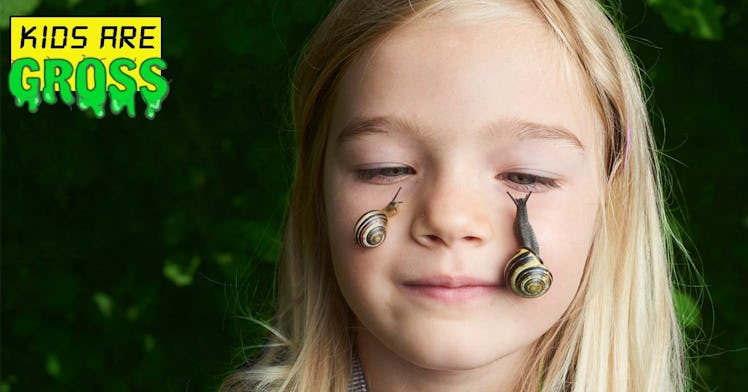Kids Are Disgusting Until Parents Teach Them To Feel Disgust
Children do not notice that they are disgusting until about four years of age. Here's how that reaction develops.

Children do not notice that they are disgusting until about four years of age. Before that, bugs are for eating, trash is for playing, and excrement is for sculpting. Then, rather suddenly, those same snot-covered kids wake up squeamish. The cry over a hair in their soup as their astonished parents furrow their brows. What happens that kids so suddenly feel disgust so strongly? How do we accidentally teach our kids to be less vile?
Paul Rozin, the University of Pennsylvania professor who pioneered the field of disgust research (“I guess I helped make it popular but…. I don’t like it too much”), has answers. As the preeminent scholar of disgust, he’s spent time trying to understand both what kids feel when those initial pangs of creeping horror set in and what they fail to feel when they laugh off the fruit fly doing the backstroke in their juice. Fatherly spoke to Rozin about how kids are indoctrinated into decency.
What causes our feelings of disgust in the first place?
It’s a wide range of things: people, countries, rotted things, atrocities. Almost everyone believes that the core of it is rotted things. The core odor of disgust is the odor of decay. Disgust blossoms out from that. There are those who think that it is biologically evolved. I do not believe it is.
Why not?
It isn’t like the bitter sensation. If something is bitter, you can mask the bitterness and eat it. But if something has worms in it, it doesn’t matter what you add to it—you won’t eat it. Sure, disgust uses the facial expression and neural machinery that reacts to a bad taste, but I do not think it has been shown that disgust is biologically evolved. You’re not born with this. Of course, that doesn’t mean it didn’t evolve. You’re not born with hair on your body, or sexual maturation.
When do children learn to feel disgust?
Little infants will eat shit. Then, around one-and-a-half, they get toilet trained and learn not to do that, and then maybe they find it disgusting. Then, around 4 or 5 years old, cross-culturally, they will not eat anything that touches something disgusting. I call this contamination sensitivity.
Why does it take so long for this to develop?
You might have thought kids would avoid decay because things of decay are often infected. But they eat that stuff. Biologically-inclined people would say that this doesn’t matter as long as the baby is under the mother’s supervision, so they don’t need to understand disgust to survive until weaning. Or, you can say what I say, which is that the act of toilet training involves such a negative disgust response from the parents that the kid picks that up.
So why does it take a few more years for contamination sensitivity to kick in?
I think it’s a cognitive limitation. The kids don’t understand what they cannot perceive. Let’s say we touch a cockroach to juice. A three-year-old won’t eat the cockroach but will drink the juice. You have to have the conception that something can be carried visibly in something because of previous contact. That’s a pretty sophisticated idea, and doesn’t appear fully until 4 or 5.
But even at four or five, kids are hardly well-mannered…
Right. Little kids don’t have full disgust until four or five —and then it becomes a funny thing. Disgust is a major source of humor. We can enjoy disgust, just as we enjoy other negative emotions like anger or fear if we’re not really threatened by them. A cartoon of someone stepping in shit can be funny, but if you stepped in shit it would not be funny. Boys, who are generally less sensitive to disgust than girls, seem to get a kick out of grossing out other people, especially girls.
Can disgust be taught? Do I have any hope of making my kids less gross?
It is taught—toilet training tends to teach it. But what does that generalize to? One-year-olds will play with shit, and toilet training gets them out of that. But playing with your food, taking a handful of mashed potatoes and smashing your face with it? We have to teach kids how to eat. And some kids are just less inclined to learn that, than others. Kids who do those gross things grow out of it. If a 10-year-old does it, you might want to suspect that something is really wrong.
This article was originally published on